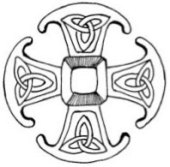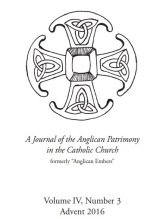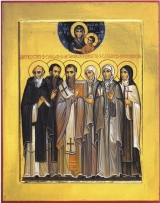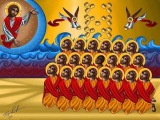EPMS points us towards this article in the Catholic Herald by Father Matthew Pittam, to supplement the laywoman’s view of Dame Joanna Bogle:
Thursday, 24 Mar 2016
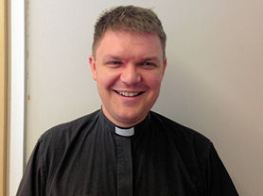 In the five years since I became a Catholic I have seen the hand of God’s blessing
In the five years since I became a Catholic I have seen the hand of God’s blessing
This Holy Week sees the fifth anniversary of my reception into the Catholic Church through the Personal Ordinariate of Our Lady of Walsingham. At my own reception the Cathedral was bursting with former Anglicans who were taking this step together as groups of pilgrims accompanying each other. Looking back over the last five years I can very much see the hand of God’s blessing. I look forward to the future in anticipation.
The announcement just over six years ago
The day that Anglicanorum coetibus hit the headlines will be one that I will always vividly remember. There was that rather awkward joint press conference between Archbishop Vincent Nichols and Archbishop Rowan Williams, which first brought the news to those who had long awaited such a development. I was a Church of England curate in the middle of my first title post, yet this was something that I had long prayed for. Full communion had always been a far-sighted goal for many in the part of the Church of England in which I existed. What seemed like a distant (possibly impossible) dream had now unexpectedly burst into the present, courtesy of a pope whose magnanimous gesture showed great generosity and ecumenical vision. I knew that I could no longer pretend to be a Catholic when the offer on the table was the real deal in the most extraordinary terms.
Initial meetings
There prevailed a certain sense of excitement as clergy gathered over the next year in various locations throughout London to prepare for what was to unfold. Meeting behind closed doors gave a clandestine character to these forums which were led at that point by Bishop Alan Hopes. We were leaping into the unknown. Nobody knew what the Ordinariate would look like, who would lead us and how we would live. Many had family and dependants to consider. There was no guarantee of ordination and some of the Anglican clergy in that initial group remain lay Catholics to this day.
Initial formation and training commenced at Allen Hall and then at regional centres after ordination. The St Barnabas Society really came into its own during this period. My family and I moved into my own home and started paying a mortgage again.
After ordination
Alongside seven other deacons, I was ordained to the priesthood on June 12 2011 by Archbishop Bernard Longley, having been ordained to the diaconate six days earlier in the chapel at St Mary’s College, Oscott. I belonged to an Ordinariate group with two priests and about 30 laity. Simple mathematics made it clear that such a small group would struggle to sustain even one priest, let alone two who both had wives and families. With this in mind I returned to secular employment as a mental health social worker. Several clergy at this time also returned to previous occupations in order to support themselves. At this time I became assistant priest in the parish that I now care for as priest in charge. I would say Mass after work and try to fit my parish responsibilities around my work commitments.
Present day
At present I have a fulfilling ministry as a secondary school chaplain, a hospital chaplain and as the priest in a small rural parish. Fitting time in for family, study and recreation is always a challenge. My weeks are always overloaded and complete days off are a rarity.
I am the named representative for Leicestershire within the Ordinariate. This role has borne some fruit. I continue to lead exploration days for people interested in the Ordinariate and individual Anglicans do contact me from time to time for advice and guidance about ways forward for them. Several receptions into the Church have taken place but owing to the long distances and no natural nucleus forming, a group has not been gathered together as has happened elsewhere in the country.
The main reason that numbers have not been significant in my area is that those who said that they would become Catholic through the Ordinariate have simply not materialised. From my early 20s, I attended meetings of Anglicans who discussed where their futures lay, as the days in the Church of England for Anglo-Catholics seemed to be numbered. Many of those who were the most vocal in the campaigns of the time and threatened to leave the C of E if a structural solution could not be found remain rooted in their dwindling Anglo-Catholic world. They merely laid aside the Holy Father’s invitation and became bitter towards those who tried to bring his vision to realisation.
Future hopes
I find it hard to believe that I have not always been a Catholic. I could not imagine another existence. People often ask me if I am glad that I ‘made the move’. The answer is a definitive yes.
So what is the future for the Ordinariate? Laity and clergy have left lifelong parishes, religious communities and job security in order to make this work. Ordinariate laity are brave pioneers who have demonstrated that they are not wedded to beautiful buildings or their historic communities. We are still young and people should not expect us to run before we can walk. Things will develop, perhaps in more unexpected ways. From the time of Blessed John Henry Newman, Anglicans have helped to shape and be shaped by the Catholic Church in Britain. We always gain more than we bring, but this mutual exchange is part of the vision of Anglicanorum coetibus.




